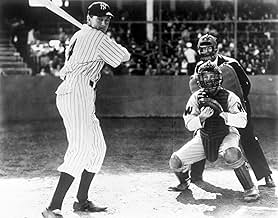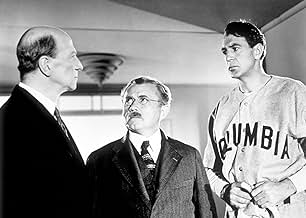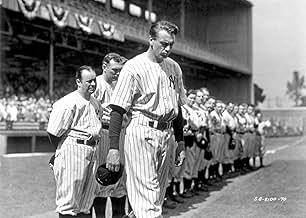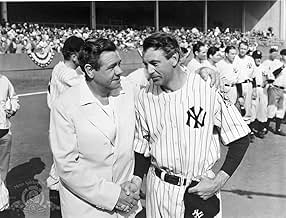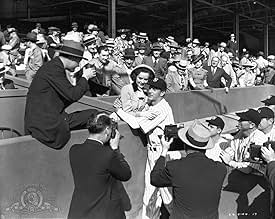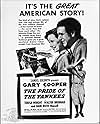AVALIAÇÃO DA IMDb
7,6/10
12 mil
SUA AVALIAÇÃO
A história da vida e da carreira do famoso jogador de beisebol Lou Gehrig.A história da vida e da carreira do famoso jogador de beisebol Lou Gehrig.A história da vida e da carreira do famoso jogador de beisebol Lou Gehrig.
- Ganhou 1 Oscar
- 1 vitória e 10 indicações no total
Ludwig Stössel
- Pop Gehrig
- (as Ludwig Stossel)
Bob Meusel
- Robert W. Meusel
- (as Robert W. Meusel)
Enredo
Você sabia?
- CuriosidadesIn reality, Gary Cooper was decidedly not a fan of baseball and required extensive coaching in order to look even passable on a baseball diamond. In fact, he had never played the game before, even as a youth, and had never even seen a baseball game in person until he was hired for this film.
- Erros de gravaçãoAs Gehrig (Cooper) is doing his homework at Columbia, he writes with his right hand. Whilst Gehrig batted and threw left-handed, like many lefties of the era (perhaps because of "correction" in school), he wrote with his right hand.
- Citações
[last lines]
Lou Gehrig: [his farewell speech]
Lou Gehrig: Today, I consider myself the luckiest man on the face of the earth... play ball!
- Cenas durante ou pós-créditosOpening credits acknowledgment: Appreciation is expressed for the gracious assistance of Eleanor Gehrig (as Mrs. Lou Gehrig) and for the cooperation of Ed Barrow (as Mr. Ed Barrow) and the New York Yankees arranged by Christy Walsh.
- Versões alternativasA colorized version is available.
- ConexõesFeatured in Diamonds on the Silver Screen (1992)
- Trilhas sonorasTake Me Out to the Ball Game
(1908) (uncredited)
Music by Albert von Tilzer
Played during the opening credits and often in the score
Avaliação em destaque
In today's era of greedy athletes and their employers, the story of Lou Gehrig seems almost quaint. Here's a young man who by all accounts was selfless, kind-hearted, and rather introverted. And, of course, it didn't hurt that he was also a very good baseball player too. Put him on a lineup card today and he might not be the same player. Up until a few years ago, Gehrig's record of 2,130 consecutive games played was a record, a record that many thought would stand forever. For 16 years he was in the lineup as the Yankees' first baseman, never asking out for any reason. That alone should show you how special a person Gehrig was.
This biography is pretty straightforward. Unlike many of its kind, it doesn't show its protagonist somehow succeeding against all odds. Gehrig didn't have an abusive mother, he wasn't beaten up by kids at school, he wasn't learning-disabled, he didn't have attention-deficit disorder, he didn't come from abject poverty. He was simply a son in a working-class, immigrant family, as many were during the early decades of this century. And that's why Gehrig is so special to so many people - he symbolises their own hopes.
Gary Cooper is aces as Gehrig, and Teresa Wright is wonderful as his wife, Eleanor. If there's anything imperfect about the movie, it's that it is...well, a little predictable. That's something biopics can't avoid, of course, so it's no big problem. But even if most of the film doesn't impress you, the final speech at Yankee Stadium - when Gehrig was suffering visibly from the disease that would eventually be named after him - will move you past tears. And even better, when Gehrig's done his brief speech, he walks offscreen. If that movie were written today, he'd play another game and hit a game-winning home run. It's this film's honesty and sincerity that win you over.
This biography is pretty straightforward. Unlike many of its kind, it doesn't show its protagonist somehow succeeding against all odds. Gehrig didn't have an abusive mother, he wasn't beaten up by kids at school, he wasn't learning-disabled, he didn't have attention-deficit disorder, he didn't come from abject poverty. He was simply a son in a working-class, immigrant family, as many were during the early decades of this century. And that's why Gehrig is so special to so many people - he symbolises their own hopes.
Gary Cooper is aces as Gehrig, and Teresa Wright is wonderful as his wife, Eleanor. If there's anything imperfect about the movie, it's that it is...well, a little predictable. That's something biopics can't avoid, of course, so it's no big problem. But even if most of the film doesn't impress you, the final speech at Yankee Stadium - when Gehrig was suffering visibly from the disease that would eventually be named after him - will move you past tears. And even better, when Gehrig's done his brief speech, he walks offscreen. If that movie were written today, he'd play another game and hit a game-winning home run. It's this film's honesty and sincerity that win you over.
- dfranzen70
- 29 de fev. de 2000
- Link permanente
Principais escolhas
Faça login para avaliar e ver a lista de recomendações personalizadas
Detalhes
- Data de lançamento
- País de origem
- Idioma
- Também conhecido como
- The Pride of the Yankees
- Locações de filme
- Empresa de produção
- Consulte mais créditos da empresa na IMDbPro
- Tempo de duração2 horas 8 minutos
- Cor
- Proporção
- 1.37 : 1
Contribua para esta página
Sugerir uma alteração ou adicionar conteúdo ausente

Principal brecha
By what name was Ídolo, Amante e Herói (1942) officially released in India in English?
Responda

